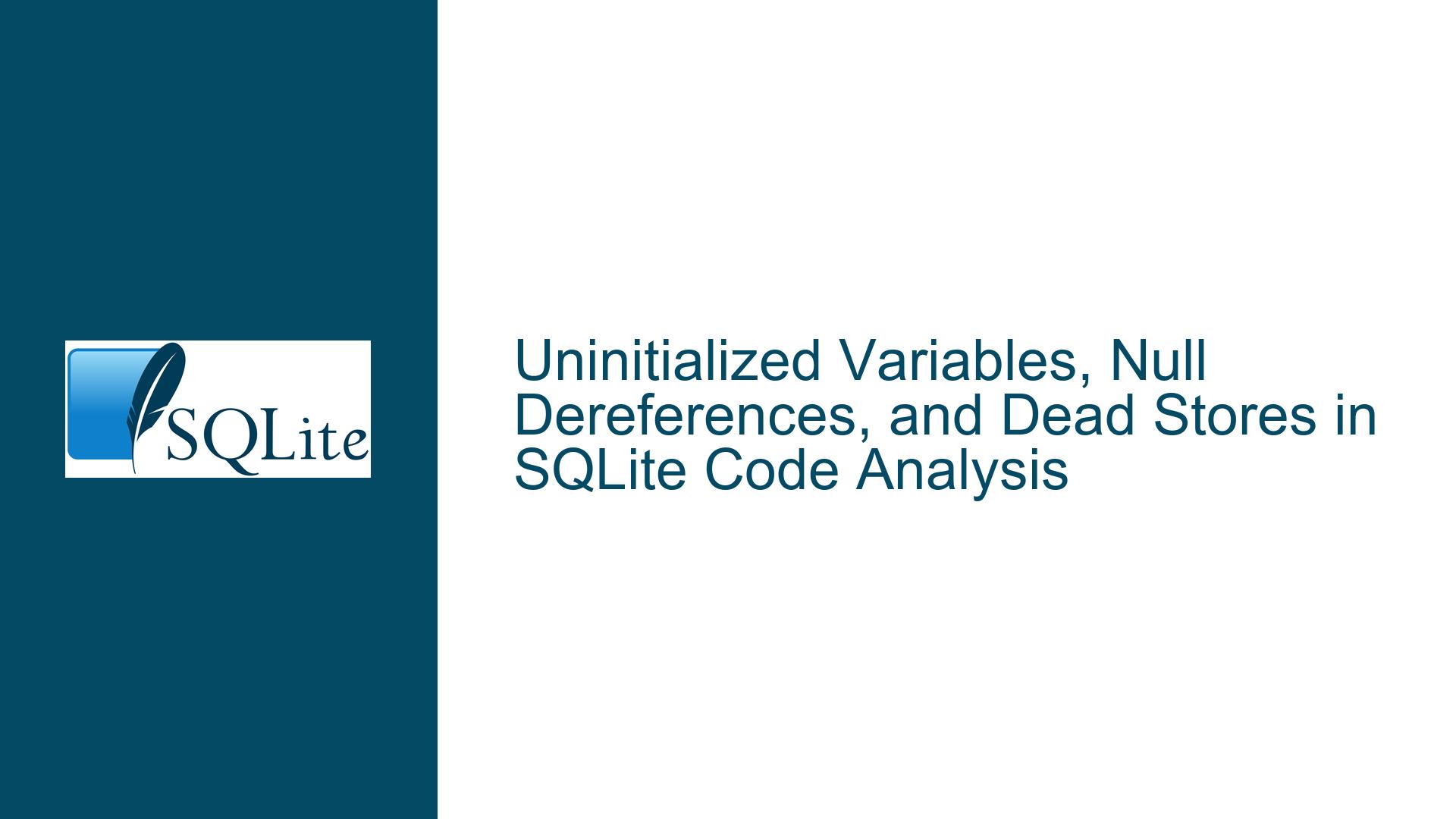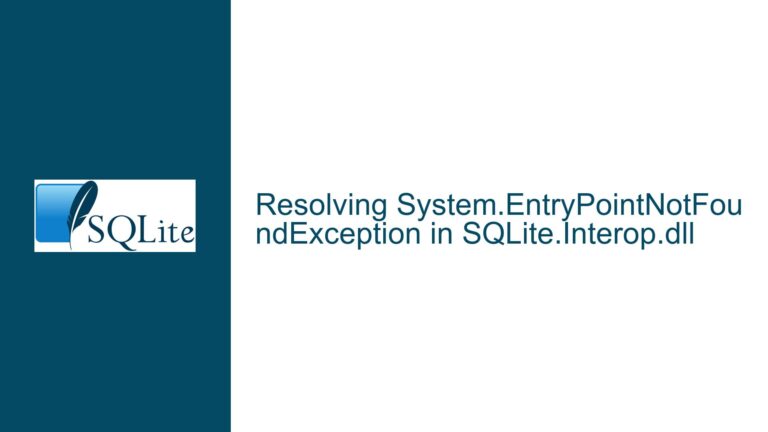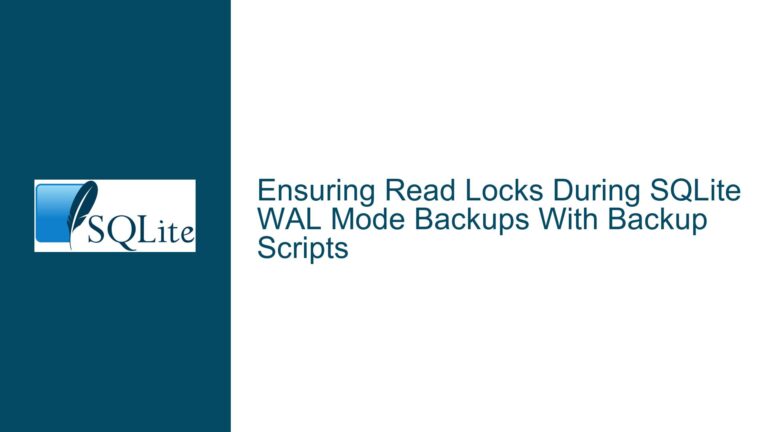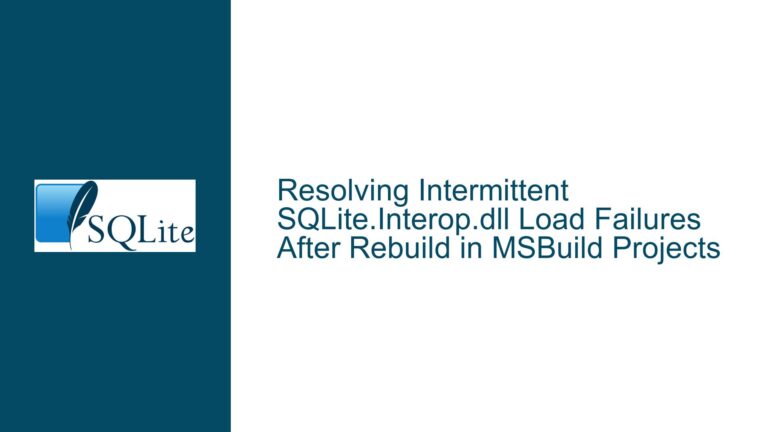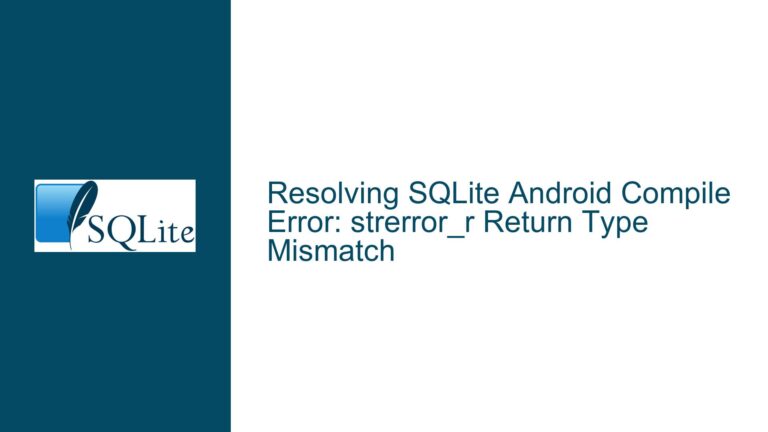Uninitialized Variables, Null Dereferences, and Dead Stores in SQLite Code Analysis
Issue Overview: Uninitialized Variables, Null Pointer Dereferences, and Dead Code Stores in SQLite
The SQLite codebase, like any large-scale software project, is subject to potential vulnerabilities that may arise from coding oversights, toolchain limitations, or complex control flow patterns. A recent analysis using the Infer static code analysis tool identified 136 distinct issues across SQLite 3.37.0, categorized as follows:
Uninitialized Variable Access (85 instances)
These occur when variables are read before being explicitly assigned values. Examples include:tool/mkkeywordhash.c:520: Array index calculation using uninitializedaKWHashelementsshell.c:2945: Use ofnvariable after readlink() loop terminationsqlite3.c:32368: Return of potentially uninitializedcin string comparison logic
Null Pointer Dereferences (18 instances)
Situations where pointers might be dereferenced without prior null checks:tool/lemon.c:1357: Configuration pointercfpassigned vianewconfig()without null verificationshell.c:15638: Direct dereference ofzTextpointer after assignment fromsqlite3_value_text()
Dead Stores (33 instances)
Variables assigned values that are never subsequently used:shell.c:6269: Unused loop counterjin regex enginesqlite3.c:76785: UnusednSrcPagevariable in backup logic
These findings primarily affect SQLite’s build tools (mkkeywordhash.c, lemon.c) and shell utilities (shell.c), with additional issues in core database engine components. While static analysis tools like Infer provide valuable insights, their results require careful validation due to inherent limitations in path-sensitive analysis and code pattern recognition.
Possible Causes: Static Analysis Limitations and Code Complexity Patterns
1. False Positives in Uninitialized Variable Detection
Static analyzers often fail to recognize variables initialized within loops or conditional branches that must execute before variable use. Consider this critical example from shell.c:2945:
while(1){
n = readlink(pCur->zPath, aBuf, nBuf); // Initialization inside loop
if(n < nBuf) break;
// Buffer resize logic
}
sqlite3_result_text(ctx, aBuf, n, SQLITE_TRANSIENT); // n ALWAYS initialized
Infer incorrectly flags n as uninitialized because it assumes the while loop might not execute. However, the loop’s while(1) structure guarantees at least one iteration, ensuring n is assigned. This demonstrates how control flow patterns that are obvious to human reviewers confuse automated tools.
2. Macro Expansion and Generated Code
SQLite employs code generation for keyword hashing (mkkeywordhash.c) and parser construction (lemon.c). Analyzers struggle with:
- Preprocessor Macros: Complex macro chains in
sqlite3.cobfuscate variable initialization paths - Generated Arrays: Tools like
mkkeywordhashdynamically create lookup tables, leading to false uninitialized array warnings (e.g.,aKWHashinitialization via hash collision resolution)
3. Conservative Pointer Nullability Assumptions
In functions like lemon.c’s newconfig(), static analyzers cannot prove non-null returns from memory allocators, even when SQLite’s error handling ensures termination on allocation failure:
cfp = newconfig(); // Analyzer assumes possible NULL
cfp->rp = rp; // Flagged as null dereference
SQLite typically aborts via sqlite3FatalError() on OOM conditions, making post-allocation null checks redundant. This design choice conflicts with analyzer expectations of explicit null checks.
4. Dead Code from Feature Flags and Portability Layers
The sqlite3.c amalgamation contains platform-specific code guarded by #ifdef directives. Unused branches (e.g., Windows-specific file locking) may contain variables initialized but never read, triggering dead store warnings in cross-platform analysis.
Troubleshooting Steps, Solutions & Fixes: Validating and Addressing Static Analysis Findings
Step 1: Triaging True Positives vs. False Positives
a. Uninitialized Variable Verification
Control Flow Analysis: Manually trace variable usage paths. For example,
sqlite3.c:32368’scvariable:while( *a && *b ){ a++; b++; N--; } return c; // c set in loop?The loop terminates when
*aor*bis zero, butcis only assigned inside the loop. Genuine uninitialized return occurs ifN<=0on entry.Solution: Initialize
cto zero before the loop.
b. Null Dereference Mitigation
- Add Defensive Checks: For pointers flagged by analyzers, even if theoretically unnecessary:
cfp = newconfig(); if( cfp==0 ) return; // Prevent hypothetical crash cfp->rp = rp; - Leverage Compiler Attributes: Use
__attribute__((nonnull))in GCC/Clang to suppress false positives for functions guaranteed to return non-null pointers.
c. Dead Store Elimination
- Static Analysis Suppression: Annotate intentional dead stores (e.g., placeholder variables):
int rc = idxRegisterVtab(p); // Dead store (void)rc; // Silence warning - Code Pruning: Remove unused variables revealed by analysis (e.g.,
sqlite3.c:76785’snSrcPage).
Step 2: Code Modifications for Critical Findings
a. Build Tool Fixes (mkkeywordhash.c)
Initialize aKWHash array explicitly:
- unsigned short *aKWHash;
+ unsigned short *aKWHash = sqlite3_malloc(sizeof(unsigned short)*i);
+ memset(aKWHash, 0, sizeof(unsigned short)*i);
b. Shell Utility Hardening (shell.c)
Add null checks for sqlite3_value_text() returns:
const char *zText = (const char*)sqlite3_value_text(argv[0]);
- if( zText[0]=='\'' ){
+ if( zText && zText[0]=='\'' ){
c. Parser Generator Fixes (lemon.c)
Validate newconfig() allocation:
cfp = newconfig();
+ if( cfp==0 ) return NULL;
cfp->rp = rp;
Step 3: Enhancing Analyzer Accuracy
a. Suppression Directives
Use Infer’s // @infer:ignore comments for false positives after validation:
// @infer:ignore UNINITIALIZED_VALUE
while(1){ n = readlink(...); ... } // n is initialized
b. Custom Taint Rules
Teach Infer about SQLite’s OOM handling by marking sqlite3FatalError() as terminal:
%MODEL SQLite
function sqlite3FatalError(): noreturn
c. Cross-Validation with Runtime Tools
Combine static analysis with dynamic instrumentation:
# AddressSanitizer for runtime checks
CFLAGS="-fsanitize=address" ./configure
make test
Step 4: Process Improvements for Future Development
a. Continuous Integration with Multiple Analyzers
Integrate Clang Static Analyzer, Coverity, and PVS-Studio alongside Infer to compare results:
# GitHub Actions Example
- name: Run Clang Static Analyzer
run: |
scan-build --use-cc=clang ./configure
scan-build make
b. Analyzer-Friendly Code Patterns
- Explicit Initialization:
int n = 0; // Instead of relying on control flow - Guard Clauses for Pointers:
assert( pNew != NULL ); // Aid analyzer nullability tracking
c. Generated Code Annotation
Mark generated files to exclude them from analysis:
// Generated by mkkeywordhash.c - DO NOT ANALYZE
static const char *aKeywordTable[] = { ... };
Step 5: Monitoring and Regression Prevention
a. Baseline False Positive Tracking
Maintain a suppressions.json file documenting analyzed false positives:
{
"shell.c:2945": {
"reason": "n guaranteed initialized by while(1) loop",
"analyzer": "Infer 1.1.0"
}
}
b. Differential Analysis
Compare analyzer outputs across versions to detect new issues:
infer capture -- make
infer analyze --compare-report previous_infer_results
c. Fuzzing Integration
Complement static analysis with libFuzzer targets for critical components:
// Fuzzer for SQL parsing
int LLVMFuzzerTestOneInput(const uint8_t *data, size_t size) {
sqlite3_open(":memory:", &db);
sqlite3_exec(db, (const char*)data, NULL, NULL, NULL);
sqlite3_close(db);
return 0;
}
By systematically addressing true positives, suppressing false positives with justification, and enhancing code quality practices, SQLite maintainers can leverage static analysis tools effectively while avoiding alert fatigue. The key lies in recognizing the symbiotic relationship between human expertise and automated tools—where the former provides contextual understanding and the latter offers scalable anomaly detection.
